Related Research Articles

Taja Kramberger is a Slovenian poet, translator, essayist and historical anthropologist from Slovenia. She lives in France.
Slovene literature is the literature written in Slovene. It spans across all literary genres with historically the Slovene historical fiction as the most widespread Slovene fiction genre. The Romantic 19th-century epic poetry written by the leading name of the Slovene literary canon, France Prešeren, inspired virtually all subsequent Slovene literature.

Oton Župančič was a Slovene poet, translator, and playwright. He is regarded, alongside Ivan Cankar, Dragotin Kette and Josip Murn, as the beginner of modernism in Slovene literature. In the period following World War I, Župančič was frequently regarded as the greatest Slovenian poet after Prešeren, but in the last forty years his influence has been declining and his poetry has lost much of its initial appeal.

Aleš Šteger is a Slovene poet, writer, editor and literary critic. Aleš belongs to a generation of writers that started to publish right after the fall of Yugoslavia. His first poetry collection Šahovnice ur (1995) was sold out in three weeks after publication and indicated a new generation of Slovenian artists and writers.
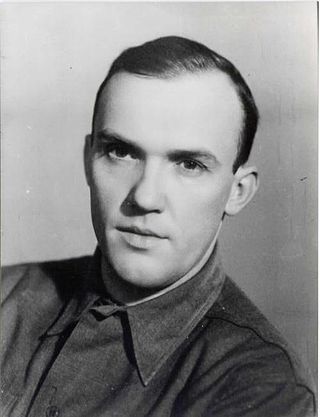
Matej Bor was the pen name of Vladimir Pavšič, who was a Slovene poet, translator, playwright, journalist, and Partisan.
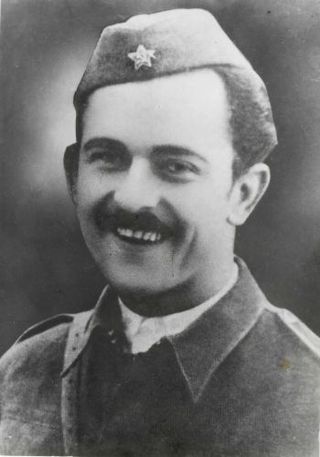
Karel Destovnik, pen name and nom de guerre Kajuh was a Slovenian poet, translator, resistance fighter, and Yugoslav people's hero.
Josip Osti was a Bosnian and Slovenian poet, prose writer and essayist, literary critic, anthologist and translator.
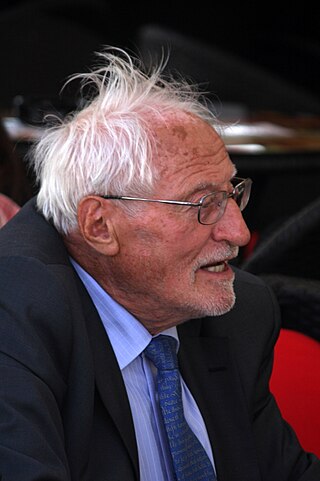
Tone Pavček was one of the most influential Slovene poets, translators, and essayists from the first post-war generation. He published numerous collections of poetry, well received by readers and critics alike. He also translated a number of Russian works into Slovene.

Goran Vojnović is a Slovenian writer, poet, screenwriter and film director. He is best known for his 2008 novel Southern Scum Go Home which won him numerous awards as well as a lawsuit filed by the Slovenian Police that was withdrawn a day later after media attention and public outrage at police filing charges for a work of fiction brought embarrassment to the Slovenian Ministry of Interior.
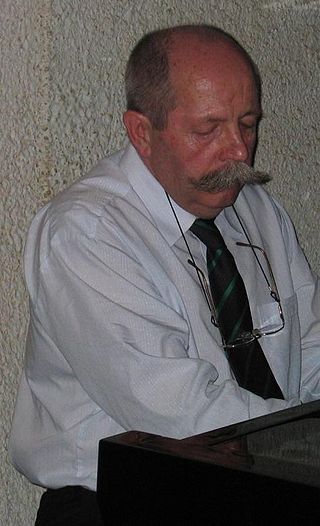
Milan Dekleva is a Slovene poet, writer, playwright, composer and journalist.

Kajetan Kovič was a Slovene poet, writer, translator, and journalist. In 1978, he received the Prešeren Award, the highest artistic award in Slovenia, for his poetry collection Labrador.
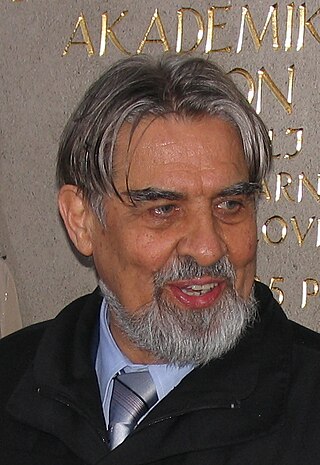
Ciril Zlobec was a Slovene poet, writer, translator, journalist and former politician. He is best remembered for his poems, publishing several volumes of poetry in his lifetime. In 1990 he became a member of the Presidency of Slovenia at a critical time for Slovene independence.

Milan Jesih is a Slovene poet, playwright, and translator. He was the president of the Slovene Writers' Association between 2009 and 2011.
Primož Čučnik is a Slovene poet, editor and translator. He has published numerous poetry collections.
Andrej Medved is a Slovene poet, editor and translator. He has published numerous poetry collections.
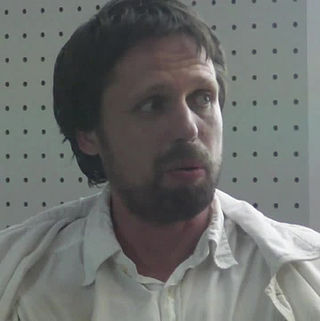
Miklavž Komelj is a Slovene poet and art historian.
The Veronika Award is a literary award in Slovenia awarded each year for the best Slovene poetry collection of the year. It has been bestowed since 1997 by the Municipality of Celje at the Veronika Festival that takes place at Celje Castle. The festival and the award are named after Veronika of Desenice, wife of Frederick II, Count of Celje, accused of witchcraft, incarcerated in Ojstrica Castle and murdered in around 1425. The winner receives a financial award. Since 2005 a separate Poetry Gold Medal is bestowed on a poet for their life achievement that has contributed to the richness of Slovene poetry, language and culture.
Barbara Korun is a Slovene poet. She is one of the leading figures in the generation of radical young women poets in Slovenia and her poems have also been translated into English and published in the USA and Ireland.
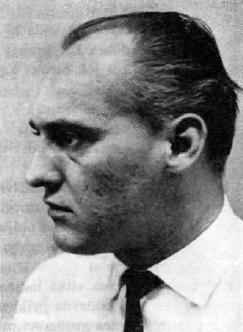
Ivan Minatti was a Slovene poet, translator, and editor. He started writing poetry before World War II, but principally belongs to the first postwar generation of Slovene poets. He is one of the best representatives of Slovene Intimism.
Katja Perat is a Slovenian novelist, essayist, and poet currently based in the U.S. A graduate of Philosophy and Comparative Literature from the University of Ljubljana Faculty of Arts, her books of poetry have been nominated for numerous awards in Slovenia. Her work has been noted for its frequent criticism of the Slovene national press.
References
- ↑ "Predstavitev (Slovene PEN site)". penslovenia-zdruzenje.si. Archived from the original on 4 September 2012.
- ↑ "Veronikina nagrada 2000 (Veronika Award site)". veronikini-veceri.si. Retrieved 2 July 2017.